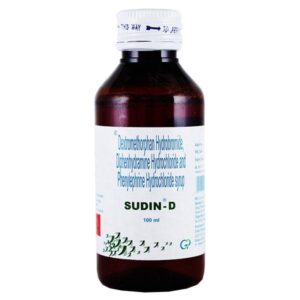DEXTROMETHORPHAN + PHENYLPROPANOLAMINE + DIPHENHYDRAMINE
Dextromethorphan: Dextromethorphan is a drug commonly used as a cough suppressant. It belongs to the class of drugs known as antitussives, which are medications that help relieve coughing. The drug is available over-the-counter and in prescription-strength formulations.
The mechanism of action of dextromethorphan is not fully understood. It is believed to work by acting on the cough center in the brain, specifically the medullary cough center. It reduces the sensitivity of the cough reflex, which ultimately leads to a decrease in the frequency and intensity of coughing.
The usual recommended dose of dextromethorphan depends on the formulation and strength of the medication. For over-the-counter products, the typical adult dose is 10-20 mg every 4-6 hours, not to exceed 120 mg per day. However, it is essential to carefully follow the instructions provided by the specific product or as directed by a healthcare professional. For prescription-strength formulations, the dosage will be determined by a doctor.
Common side effects of dextromethorphan include dizziness, drowsiness, nausea, vomiting, stomach discomfort, and constipation. These side effects are usually mild and go away on their own. However, if they become severe or persistent, it is important to seek medical attention. Additionally, it is important to note that dextromethorphan can interact with other medications, such as certain antidepressants, causing a potentially serious condition called serotonin syndrome. Therefore, it is crucial to inform healthcare providers about all medications being taken before starting dextromethorphan.
It is important to note that dextromethorphan has the potential for abuse and can cause hallucinations and dissociative effects at higher doses. Misuse or abuse of dextromethorphan can be dangerous and even life-threatening. It is important to use the drug only as directed and to keep it out of reach of children.
Overall, dextromethorphan is an effective antitussive medication used to suppress cough. It is crucial to follow the recommended dose and consult with a healthcare professional if there are any concerns or questions.
Phenylpropanolamine: Phenylpropanolamine (PPA) is a sympathomimetic drug that was commonly used as a decongestant and appetite suppressant. However, it has largely been discontinued and banned in many countries due to safety concerns.
The use of PPA included the treatment of nasal congestion, sinusitis, and allergic rhinitis. It was also utilized as an appetite suppressant for weight loss in some cases. However, its use has been significantly reduced due to reports of serious side effects.
The exact mechanism of action of PPA is not fully understood. It is believed to work by stimulating alpha-adrenergic receptors in the sympathetic nervous system, leading to vasoconstriction and nasal decongestion. As an appetite suppressant, PPA acted on the hypothalamus to decrease appetite and increase satiety.
The typical dose of PPA as a decongestant was 25-75 mg every 4-6 hours, not exceeding 150 mg in 24 hours. As an appetite suppressant, the usual dose was 75 mg once daily. These dosages may vary depending on the specific formulation and brand.
Possible side effects of PPA included increased blood pressure, elevated heart rate, restlessness, nervousness, dizziness, insomnia, and headache. It could also cause gastrointestinal disturbances such as nausea, vomiting, and abdominal pain. In rare cases, PPA was associated with severe cardiovascular events like stroke and hemorrhage.
Due to these serious side effects, many regulatory authorities, including the U.S. Food and Drug Administration (FDA), removed PPA from over-the-counter medications. It is important to note that PPA should not be used without the guidance of a healthcare professional, as its risks outweigh its potential benefits.
Diphenhydramine: Diphenhydramine is an antihistamine drug that is primarily used to treat symptoms of allergies, such as sneezing, itching, watery eyes, and runny nose. It is also commonly used as a sleep aid due to its sedative properties.
The mechanism of action of diphenhydramine involves blocking the effects of histamine, a substance that is released during an allergic reaction. By inhibiting the actions of histamine, diphenhydramine can alleviate allergy symptoms.
Diphenhydramine is typically taken orally in the form of tablets or capsules. The recommended dose for adults is 25 to 50 mg every four to six hours, but should not exceed 300 mg in a 24-hour period. For children, the dose varies depending on their age and weight, and it is important to follow the instructions provided by a healthcare professional or on the packaging.
While diphenhydramine is generally considered safe, it can cause some side effects. The most common side effects include drowsiness, dizziness, dry mouth, blurred vision, constipation, and urinary retention. These side effects are more likely to occur at higher doses or in individuals who are sensitive to the drug. It is important to be cautious when taking diphenhydramine, especially if engaging in activities that require alertness, such as driving or operating machinery.
In some cases, diphenhydramine may also cause paradoxical reactions, meaning it can have the opposite effect than intended. Instead of causing drowsiness, it may cause restlessness, agitation, or excitability. If any unusual or severe side effects occur, it is advisable to consult a healthcare professional.
It is worth noting that diphenhydramine can interact with other medications, so it is important to inform your healthcare provider about any other drugs you may be taking to avoid potential interactions.

